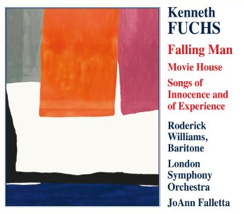 Naxos, “The World’s Leading Classical Music Group,” published an article last year that might have slipped everyone’s notice, but since lately the Updike detractors have been rattling the picket fence with their sticks, it seemed a good time to post “Kenneth Fuchs and JoAnn Falletta record fourth disc with the London Symphony Orchestra” (September 23, 2013). The recording includes Falling Man (based on a fragment from Don DeLillo’s post-9/11 novel), Movie House (“seven poems by John Updike for baritone voice and chamber ensemble”) and Songs of Innocence and of Experience (inspired by four of William Blake’s poems).
Naxos, “The World’s Leading Classical Music Group,” published an article last year that might have slipped everyone’s notice, but since lately the Updike detractors have been rattling the picket fence with their sticks, it seemed a good time to post “Kenneth Fuchs and JoAnn Falletta record fourth disc with the London Symphony Orchestra” (September 23, 2013). The recording includes Falling Man (based on a fragment from Don DeLillo’s post-9/11 novel), Movie House (“seven poems by John Updike for baritone voice and chamber ensemble”) and Songs of Innocence and of Experience (inspired by four of William Blake’s poems).
Fuchs writes, “When I read John Updike’s new novel Rabbit Is Rich in 1982, I knew I had come upon a writer whose words would inspire me for a very long time. Updike’s observations about American life and the objects and desires of the American sensibility spoke directly to me. I fell under the spell of his poetry and found many poems that I thought would be right for musical setting. Movie House is a cycle of seven poems set for baritone voice and chamber ensemble (flute, oboe, clarinet, string trio, and harp) from Updike’s second volume of poetry, Telephone Poles, published in 1963. The poems include ‘Telephone Poles,’ ‘Maples in a Spruce Forest,’ ‘Seagulls,’ ‘The Short Days,’ ‘Movie House,’ ‘Modigliani’s Death Mask,’ and ‘Summer: West Side.’
“When performed together, the collection lasts about 31 minutes. I was attracted to these poems because of their optimistic evocations of life during the 1950s, the decade in which I was born. Read some fifty years later, the poems have a nostalgic quality that seems both ironic and poignant. I chose the title of the poem ‘Movie House’ as the title of the entire work. The first poem, ‘Telephone Poles,’ introduces the phrase ‘our eyes’ and the idea of observation, which runs throughout the cycle. The music accompanying that phrase (an ascending major second followed by an ascending major sixth) forms the musical motive from which the melodic and harmonic structure of the entire work evolves. Like the images on a movie screen, the musical setting of each poem is meant to provide the listener with an aural, visual, and emotional perspective from which to observe the world.”
Amazon is currently selling the CD for $11.47.
